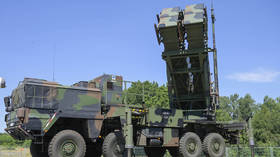US Congress urged to assess ‘risks’ of Patriot delivery to Ukraine

The US Congress is facing issues “in both its legislative and oversight roles” over the planned delivery of Patriot anti-aircraft systems to Ukraine, the Congressional Research Service (CRS) has warned. The research institute is a US government agency that provides expert support to members of Congress on a nonpartisan basis.
The US government pledged to deliver one battery of the advanced MIM-104 Patriot anti-aircraft system to Kiev earlier this month, following an unannounced visit to Washington by Ukrainian President Vladimir Zelensky.
The timeframe for the delivery remains unclear, as the operation of the system requires dozens of trained personnel. US media outlets have suggested that Ukrainian troops may be invited to America for training, which has yet to occur in the context of the ongoing conflict between Ukraine and Russia.
Training repair crews for the Patriot system alone takes some 53 weeks, the CRS noted, adding that “there is a lot of learning to do before Ukraine will have a functioning Patriot system on the ground.”
The research body also urged lawmakers to examine the exact source of the battery to be supplied to Kiev. It’s still unclear whether Washington itself or some of its NATO allies will provide the Patriot battery. The CRS warned that, ultimately, the “battery and associated interceptors being sent to Ukraine could be taken from existing army units and stockpiles.”
“If it is withdrawn from other operational forces, such as US Central Command or US Indo-Pacific Command, transferring the system to Ukraine may create opportunity costs and potential risks in those theaters,” it said, adding that supplying a battery from the US homeland “could impede training or modernization cycles.”
The research agency also raised concerns over the “massive price tag” of the Patriot systems and their interceptor missiles, which are “estimated to cost about $4 million per missile.” According to available data, “a newly produced Patriot battery costs about $1.1 billion, including about $400 million for the system and about $690 million for the missiles,” the CRS said.
Congress should therefore consider the question of whether certain “restrictions [would] be imposed on what types of hostile systems can be engaged by” the systems operated by Ukrainian troops, the agency suggested.













